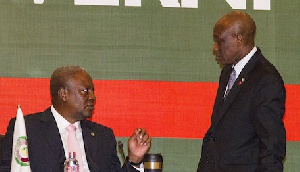The August 2014 report on Ghana’s economy by the Economist Intelligence Unit (EIU), states that, it will be very difficult to reduce the unsustainably high fiscal deficit currently being experienced, following the large increases in public-sector wages awarded in recent years.
According to the EIU, the situation has made it impossible for government to maneuver in its spending, particularly, in critical areas such as infrastructure.
Below are EIU’s statements on Ghana’s fiscal and monetary policies:
Bringing down the unsustainably high fiscal deficit will be made difficult by the large increases in public-sector wages awarded in recent years, which have left less room for maneuvers when it comes to spending on critical areas, such as infrastructure.
Better control of the wage bill will prove politically difficult as public-sector labour unrest increases against a backdrop of rising inflation. Public debts also surged, to 55% of GDP in 2013, to cover the deficits, and servicing this will take up more of future budgets; interest payments will account for close to 12% of expenditure in 2014.
The removal of the fuel subsidy in June 2013 and the partial removal of utility subsidies announced in September 2013 will help to tame expenditure growth, and saving on capital investments may be made, not least because of a lack of capacity to execute all the planned projects. However, Ghana’s infrastructure deficit needs more investment, not less, if longer-term growth is to be assured.
With overall economic growth below government projections in 2014-16, so will be the tax take. However, the onset of production at the Tweneboa-Enyenra-Ntomme (TEN) oilfields from 2017 will boost oil company taxes towards the end of the forecast period.
Overall, we expect the budget deficit in 2014 to miss the government’s target of 8.5% of GDP, coming in at 9.7% as the government struggles with the wage bill.
A reduction to 8.3% of GDP will be possible in 2015, but this is again higher than the government projection of 7.5% of GDP. We have little faith that this government will be any more able to resist the temptation to increase expenditure in election years than its immediate predecessors.
Therefore, we forecast that the deficit will widen to 9.4% of GDP in the election year of 2016, before narrowing to 7.3% of GDP in 2018 as oil taxes increase strongly.
The government is planning another Eurobond issuance in 2014, but it may be put off by the likely high yield it will need to offer. Regardless of the sources of the borrowing, public debt is expected to surpass 70% of GDP in 2014 and, although it will start to edge down in 2017-18, will remain high and necessitate continued fiscal tightening beyond the forecast period.
This highlights the need to spend the debt contracted in ways that support longer-term economic growth.
The Bank of Ghana (the central bank) faces the partly contradictory monetary policy pressures of containing inflation while fostering economic growth. With the cedi expected to remain under pressure from the fiscal and current-account deficits, interest rates will be kept high throughout 2014.
Inflationary pressure should drop out of ease as the year progresses and into 2015 as the utility price increases dropout the calculations. Nevertheless, rates may need to be tightened once again in 2016 to neutralize higher fiscal spending.
As well as tight monetary policy, lending to the private sector will be constrained by crowding-out effect of heavy government borrowing. However, as the economy grows and business opportunities arise, commercial banks should begin to undertake greater lending to the private sector.
Business News of Friday, 8 August 2014
Source: The Informer

















